How Did Trump Win in 2024?
The Mimetic Psy-War of Confidence by Trump, Musk, and a Frenchman Named Theo
Depending on your view of the world, Trump won his first, second, or third presidential election last week.
Or perhaps if you believe 2016 was rigged by Russian interference and as some have already suggested, 2024 was rigged again by Russians and “Trump’s little secret with Mike Johnson”, Trump has never really “won”:
Your choice.
But whatever the case, Trump won, and seems destined to do so far more handily than most polling averages and election forecasts predicted, besting his 2016 electoral vote margin by adding Nevada, bringing the Republican’s first lead in the popular vote in 20 years, winning traditionally tight Florida by double-digit margins and coming within a surprising 5% margin of winning typically deep-blue New Jersey.
But Trump’s victory, while I’m excited about it in total, far more on the whole than when I last voted for him in 2020, albeit with very major concerns about his softening of position on pro-life matters, actually shocked me. How come it happened?
Not of course because of all of the issues with Biden and the Democrats, inflation, crime, the border. I’m not asking about all the reasons why people voted for Trump. They’re obvious. In fact in a “pre-mortem” that doubled as his ready-made post-mortem for why Trump won, polling analyst Nate Silver listed twenty-four reasons for why Trump could/did win and could only think up six for Harris.
What confuses me, however, is the seeming logical inconsistency in Trump / Republican assumptions about elections, fraud, “the system”, “the deep state”, etc. If the elections were rigged against Trump in 2020 when Trump had a far more establishment-friendly and “typically Republican” agenda than his, to be honest, far more radical Elon Musk, RFK Jr., Ron Paul, and Tulsi Gabbard-influence current plans, why weren’t they rigged last week?
Why was Trump allowed to win? Why isn’t the election still going on? I know Arizona is still counting as of today, but remember four years ago when the map looked like this two days after the election:
And how all the results in states like Michigan looked first to be headed in Trump’s direction but then suddenly jumped in Biden’s favor?
Or how Georgia just miraculously found enough mail-in ballots after they were initially in Trump’s favor at 99% reporting to also precisely shift the balance?
So why didn’t it happen this time around when the stakes, were, and still are, far higher for the regime? If you have the motivation and the power to ensure a Harris victory and end the Trump era for good why wouldn’t you?
What else could be different this time?
One simple solution is that fraud was tried and Republicans and the Trump campaign were better at thwarting in advance or at least catching and stopping it.
Sundance at The Last Refuge suggested this answer a few days ago:
And this makes some sense. Election fraud, is well-known throughout U.S. political history, with strong evidence that “party bosses” commanded the votes and the outcome in most of the big cities of the U.S. throughout the late 19th century, that the 1960 election was stolen for Kennedy, that Lyndon Johnson stole most of the early races he “won”, and as I’ve become more convinced over time, that Al Gore really did win Florida and Bush by one definition or another stole the 2000 election. But while omnipresent at small scales, the theory goes, the scale of fraud of the 2020 election was just way too large, way too bold, and way too coordinated to ever be pulled off again without being so obvious as to provoke real and not just January 6th level rebellion within America. Perhaps it is as simple as fewer mail-in ballots this cycle. Perhaps the 2020 steal was run through those
Perhaps there is also a practical limit on how much fraud can be injected into a system. Perhaps there was a similar level of fraud this cycle, and Trump just pulled in vote margins this time large enough to overwhelm it and win anyway. His whole “Too Big to Rig” slogan for this campaign was all about this strategy.
But what type of fraud are we talking about anyway? It seems important to distinguish between voter fraud and electoral fraud. Voter fraud, individuals voting who should not or people voting multiple times, is talked about by the formerly mainstream, now to be termed “corporate media”, but only to disparage it as a rare occurrence, whereas electoral fraud, messing with the tabulation or reporting of votes, is never really talked about. Interpreting this by way of a reverse Streisand effect, I’d guess that the majority of fraud is on the side of tabulation and counting, electoral fraud, not, for example, non-citizens voting or people multiple times. I’ll assume this for the sake of argument although a similar case to the one I will make could apply to voter fraud.
Surely a masterfully coordinated and centrally controlled fraud “operation” could find a way to overcome any advantage Trump could have gained in the totals, especially if vote tallies and voting machines can be tampered with, and you can literally program the outcome you want? And if you have a masterfully coordinated and centrally controlled operation why waste it?
The range of differing pieces of evidence for fraud in 2020 seems to suggest against a centrally coordinated operation, as does the difficulty for providing definitive proof of a “Official Coordinating Central Committee for the Largest Fraud Operation,” or really conclusively summing up the fraud in any simple way at all. Instead, as the ExitGroup substack suggested recently, fraud, like all of the “deep state” is decentralized and indirect:
The system is “hostile” in the sense that a fungus is hostile.
Its best weapons are entropy — in a sense, the system is entropy.
It isn’t going to send an elite black ops kill team after Trump — instead it surrounds him with DEI security, goads its most unstable constituents to violence, and hopes for the best.
It doesn’t “rig elections” from the top. Instead, it simply incentivizes a legal framework in which voter fraud is easy to do and hard to prosecute, and then tells every local election official that they have to Do Whatever It Takes to stop Literal Hitler.
This is a very robust configuration, because it is fully distributed and deniable — you can’t decapitate it, or put it on trial. Its mechanisms of coercion are so subterranean and diffuse and convoluted that it can be difficult to convince an ordinary person that they even exist.1
But decentralized and indirect voter fraud surely would still have been just as motivated this time to act this time around. Trump is still “LITERALLY Hitler” to many, as much or even more so than in 2020. Yes, security is tighter in some areas. But we also did see some perplexing California vans dropping off suitcases full of ballots late into the night in Michigan. So maybe people tried, but just didn’t try hard enough?
Yet another possibility of course is that the system, the “deep state” has somehow bought off Trump and/or the system for Trump, or Trump was really a Manchurian candidate all along, planning to draw off the Right into a “Great Awakening” that brings about the same effective outcome as the “Great Reset”? Perhaps, somehow, Trump is a “controlled opposition” and therefore the system is all in for him, and perhaps voter fraud was even conducted in his favor this time around. Mark Bisone covers some of these latter theories here. And they could be true. Perhaps they are. We just don’t know enough yet to prove any of this or give any real evidence beyond the system not seeming capable of stopping Trump. I’ll write something more about these questions sometime soon.
But whatever the case, the too crazy to be a story, yet somehow to be history truth is that the system is incapable of stopping Trump in the long run even as it secures short-term victories is the story of the last nine years, and this continued unabated with the 2024 election, somehow. So there’s that.
I have a different theory to propose for why Trump won. I don’t really hold it for its predictive power, admittedly, it’s too vague. But I hold it for its explanatory power, how much it does draw together and explain why Trump lost in 2020, why Biden was swapped out for Kamala, why Trump won in 2024, and even, get this, how some of the Democrat conspiracies about the Trump campaign and its allies might be true. Oh, and how the Republican ones about the Democrats are also true. Voter fraud was in both elections and swung the outcome in 2020, but voter fraud is itself swung by something. And that something changed in 2024, and changed the outcome in 2024.
My theory is that this presidential campaign, and the last one, have been really psy-war (psychological warfare) all along. Perhaps this is true of all politics and most human interactions, but we’ll get there in another essay.
Psychological warfare, as I’ll define it, is attacking your enemy by manipulating his actions to your advantage by manipulating what he thinks. It could be as simple as the “morale bombing” of World War II, clandestine in ways forever to be unknown, or blasted from the rooftops as with this, admittedly, worrying U.S. Army Psy-War division ad:2
In electoral politics, psy-war is manipulating both your side and your opponents in order to make him take actions that benefit your side. This could simply be “opposition research”, spreading fake (or true) scandals about them to demoralize your opponents and reduce support for their candidate while boosting yours.
But there are more sophisticated possibilities. How about not just passing information about a candidate to sway opinions about the candidates, but trying to affect people’s views through affecting how they view each candidate’s likelihood to win? A subtle shift in the direction of confidence or that of despair can affect the willingness to make the effort to vote, but it can also affect people’s willingness to do certain “other things”
In the Georgia run-off elections of January 2021 for both of the state’s senate seats, immediately after the state in the general election had inexplicably flipped at the last minute of vote counting from Trump to Biden in the latter stages of vote counting season, Trump told supporters not to bother supporting Trump-aligned candidates, because this run-off seemed just as likely to be unfair.
And I can’t blame him. Why bother? Why bother banging your head again and again against the wall of voting just to see results inexplicably come in clutch at the last moment for your opponent? If fraud rules the day and you think you’re going to lose anyway, don’t feel pressured to vote. And what’s more, don’t put resources into trying. Don’t spend money on the race. Don’t waste your time or money when you think you’re going to lose anyway.
The 2020 presidential election also had similar, err, well, I’ll call them “vibes” for voters with regard to Donald Trump. While the economy was doing well before COVID-19, war had been avoided with Iran and North Korea, and the country was about to start paying down a bit of the national debt, everything changed with the COVID lockdowns. The economy crashed due to the obvious impact of making industriousness illegal, a bad sign for an incumbent president, while extreme changes in mail-in ballot rules made fraud seem very possible, and thus likely, and therefore a Trump victory as uncertain. If you were a Trump supporter back then, you were worried, at least somewhat throughout the year as election day approached. Well, election day turned into election week, and then election season, and your fears were justified. Trump did lose. And to a Biden voter throughout the year, similarly, Trump seemed defeatable, and when he did lose, it seemed as if things had been destined to be that way.
But the 2024 campaign felt different from the beginning. Living through the period it felt like Trump had momentum, ever-increasing support, and destiny behind him, or at least for the latter cinema trained us to at least on some level expect a “Return.”
The crowd sizes, the epic images. The memes. The moments. Trump’s “Fight, Fight, Fight”, the RFK endorsement, the Al Smith Dinner, Trump working at McDonald’s, Trump in a garbage truck (with, I’m excited to brag, my second cousin Andrew Brisson driving!).3
Perhaps this wasn’t a universal feeling. Kamala had a similar but temporary “vibe shift” of seeming energy and enthusiasm in late August and early September, but independent observers like libertarian Dave Smith agreed that the general public mood was an ascendant Trump even if not all the so-called hard data like polls showed it throughout the late summer and fall.
Now a public mood or general opinion that arises suddenly could be thought of as a social mimetic mental contagion. Not necessarily a contagion in the negative sense, but as something that mimetically spreads throughout a population. Sometimes it is most definitely bad, as with the mimetic violence and scapegoating central to Rene Girard’s work4 whereby a population selects a victim and directs all their hatreds on one person or group. Broadly, however, an idea, mood, or opinion spreading or going viral in this way is normal to our desires work when we are within groups. We desire to fit in and do so by desiring what those around us desire, Girard’s central thesis, and implicitly in this soaking up the assumptions and behaviors of those around us.
Most of the time, public moods probably evolve organically in response to events. Most people, obviously, will have a similar mood, similar thoughts, similar angers, and similar desires when their country is attacked, for example. But look at other examples throughout history like the Salem Witch Trials (which I do seriously believe had a reality to them, but also went too far after running their initial course) or the Stanley cup craze of last year, or the Travis Kelce / Kansas City football, uhh, I’ll just call it contagion of earlier this year, and you see at the very least, that ideas and moods can transmit like viruses. Not all are necessarily conspiratorially designed as such, but many recent cases seem at least plausibly to have been, well, planned, and purposely started. And this would be mimetic psy-war, purposely spreading an idea or “vibes” that spread themselves, which spreads an effect, even within your enemies.
Now, what if this was how Trump won the 2024 election?
This theory started with a post by Charles Haywood:
Charles, a notable figure on both the conservative right and Orthodox spaces, had long predicted a Trump 2024 victory (followed by a yet-to-come Regime coup attempt against Trump…). The fact that Trump win seems to prove that this at least happened for some reason—there was at the very least less fraud than in 2020.
So here’s how this affects election fraud. Not just election turnout is affected by “excitement”, “vibes”, and “hope”, but also people’s willingness to cheat to win “if necessary.” If those who are willing to cheat suspect that they could get caught and/or punished they are less likely to cheat. And they would believe that they are likely to get caught if they believe that their cheating is likely to fail. Therefore, if they think their cheating is likely to fail, they won’t try it:
But why did the individual vectors of fraud, in my view as mentioned above, the vote counters, think that they would get caught? Why, in other words, was there a preconceived notion that Trump would win?
I believe that there was a deliberate psy-war strategy performed by Trump and his campaign team composed of three specific elements, three ideas that the Trump team spread for mimetic effect upon both his foes and to a degree, to boost his supporters’5 confidence. I sum them up as Trump and his team purposely acting far more confident than they actually were, and in doing so, and only by doing so, was this confidence fulfilled.
The Fraud Will Be Caught Strategy
The first strategy was talking about fraud, and making threats to any who might commit it. Simple perhaps, but the point is that the best deterrence of fraud occurs not from lawyers, poll-watchers, etc. but from those who might commit fraud thinking and worrying that they might be there. Now there was far greater Republican effort to watch for and fight suspicious activity in voting and vote counting this year through the courts. 1600 non-citizens were removed from the voter rolls in Virginia before the election this year after Republicans took the case to the Supreme Court and won.
But the bigger effort in deterrence is the person being deterred worrying about getting caught, not necessarily competence at actually catching fraud: making fraudsters have a little more to fear this time around:
Here I suggest that Trump's statements such as the one above or this one were the first stage of his psy-war strategy. Trump knew that if he won, he would probably not be able to catch all cases of fraud, and the fraud might succeed, but like in the strategy experiment the prisoner’s dilemma, he had to make the other side at least worry a little bit more than in 2020, and did so by making statements like these above frequently throughout the campaign. At least fraudsters were reminded that their actions carried a small risk, a small risk that if they failed there might be some consequences for some of them. And a small shift, could at the margins in an election close already, demoralize fraudsters enough to at least do something.
The Musk Machine Strategy
Accompanying this strategy was another thing that I called the “Musk Machine.” Elon Musk officially endorsed and began supporting the Trump campaign through his America PAC political action committee immediately after the July assassination attempt on Trump. Musk spent at least $120 million throughout the campaign season, through a variety of efforts, including voter registration and campaign workers knocking on doors in Pennsylvania, holding rallies throughout the state, launching a petition in support of the First and Second Amendments of the Constitution that paid everyone who signed it, and, ultimately, in the last days of the campaign, a sweepstakes raffle which paid one randomly selected person a day who had signed Musk’s petition 1 million dollars. The effort was critiqued ultimately as ineffective and wasteful in some corners.
However, I’ve become convinced that regular canvassing and ordinary campaigining actually weren’t the main point of Musk’s support for Trump. The point instead was to spend a lot of money in an extremely public way as a way of demonstrating that Trump now, and unlike past elections, had powerful allies. Not to diminish Mike Lindell, but in 2020 he was Trump’s biggest public ally, and, well, to be honest, has nothing next to Musk’s wealth, influence, and connections. In 2024, however, with allies like Elon Musk, Peter Thiel, Bill Ackman, David Sacks, and more, however, Trump’s foes as much as his allies, had to contend with the fact that somehow, someway, Trump is more powerful and better backed, which on just an intuitive level alone makes any potential Trump foe inkling to commit a little fraud having to wonder if, hey, is my job going to be a lot more difficult this year?
Musk by being very public with his spending and other efforts in support of Trump was forcing it to be very very front and center in the minds of Trump foes. Anyone committing fraud had to worry: Trump has Musk now. If we commit fraud this time, maybe Musk has the resources, connections, power, and interest to push through legal investigations proving it. And then, perhaps, game over. And at the very least, Trump and the political right now have a very real answer to the left’s George Soros and Mark Zuckerberg.
And they also had to contend with the fact that it wasn’t just Musk for them to worry about. There are half a dozen other billionaire backers this time, and RFK Jr., and Tulsi Gabbard, and Vivek, …
At least it helped Trump a little by deterring a little more fraud.
The “Winning” Strategy
The last strategy is a little more vague and a little more speculative and begins as a Democrat conspiracy theory.
Oh, well, at least two of them:
Let’s begin with “Trump’s little secret,” an off-hand comment that Trump made at his rally at New York’s Madison Square Garden on Oct 27th:
Trump still has not definitively explained what this “little secret” was, but the off-hand comment, had a big impact merely by Trump suggesting it, as media and Democrats assumed and worried that Trump had some nefarious cheating plan of his own.
And perhaps he did. But the real little secret, I believe, was making the other side worry that there was some other trick up Trump’s sleeve that would help him win. The comment at least diverted a lot of attention from other attacks on Trump during the closing weeks of the campaign
In addition to this, another major Democrat theory was that Trump allies were manipulating the betting markets to artificially give Trump higher odds of winning, and thereby to demoralize Democrats while vivifying Trump supporters with a bit more hope of winning.
The main concern was a user on the site Polymarket nicknamed Fredi9999, but ultimately revealed to be a Frenchman named Theo:
According to those concerned about this dangerous election manipulation, Theo—and others—were trying to trick people into supporting Trump or at least demoralizing others from opposing him, by simply making them think that Trump would win.
And I think they have a point. I doubt that Theo was working for Trump, or paid by Trump to make large bets on his behalf to swing the apparent odds of Trump winning, but the fact that a random Frenchman—and many others were willing to make large bets in favor of Trump even without conclusive polling evidence both reflects, and more importantly, reinforces a prevailing mimetic public mood.
People seeing the betting markets tilting toward Trump, especially in the last few weeks of the campaign are subtlety moved to believe them, and even if there was nothing to them other than the guesses of a few gamblers, soon everyone thinks that way, and mimetically the population is persuaded of an ascendant Trump cruising towards victory.
Even liberal-leaning pollsters like Nate Silver had to admit to themselves that they felt that way throughout the closing period of the campaign:
.Trump and his allies pointing to the odds markets, pointing to strong early voting data that favored him and the Republicans, pointing to a very strong J.D. Vance debate performance against Tim Walz, dozens of podcast appearances by Trump and Vance, and their pumping out one viral image after another acted to boost this mood, already partially ingrained in the population, further and further over time. From the depths of the 2020-2021 general mood of how could Trump ever show his face in public again to a 2024 feeling of, it’s just obvious, the shift is massive. The winds, the vibes, the energy were all on Trump’s side. It was destiny. That’s how people felt. That’s how it felt to live through late 2024.
And yet, however, I doubt that that’s how Trump himself felt. This is the point. Trump and his team were purposely acting more confident than they really were, boosting the confidence of Trump supporters who would otherwise be less than confident and demoralizing Trump opponents and potential fraudsters.
It was a tremendous bet, with tremendous downsides for all involved. For, if Trump had lost, not only would Trump’s movement after two losses be over, and Trump himself on the way to jail, Musk would have lost his government contracts by now, or by next month at the latest, X would be banned by April at the latest in the United States, the French gambler Theowould be completely broke,6 and so forth. But in our timeline, a projection of confidence in victory paid off, bigly. One could almost say, though I dislike the new-age connotations of the phrase, that belief, faith, manifested that belief into reality.
Team Kamala
Now team Kamala was also waging a psy-war of their own. This starts with how it even became Team Kamala in the first place with the outright July coup against Joe Biden. Biden was forced out because everyone began to think that he was not a great candidate and that he was likely to lose. He was not forced out because he was a poor candidate or likely to lose to Trump in the general election (although he probably was on both) but because people thought he was both of these.
Elections, and this one in particular really are won or lost on the basis of plausibility and public mood for both sides. Plausibility, belief, and prognostication change reality.
Who took out Joe Biden? Everyone knows it wasn’t Joe Biden. But it wasn’t just Chuck Schumer, Nancy Pelosi, or Cenk Uygur. It was everyone whose opinion of him changed after the first June debate against Trump.
The party, and yes there was a ton of internal politicking, forced him out because the public, even if he was capable of winning the 2024 election on a polling basis, didn’t believe he would win. The public mood of July 2024, immediately succeeding Trump’s epic “Fight, Fight, Fight,” rise after the assassination attempt, believed generally in a Trump victory. Even if they didn’t like him, the public mood was one of “Trump’s going to win.” And so the public mood had to be changed, had to be swayed, and so we got the vibe blitz that was “Brat Summer” the brief August and September period of Kamala buzz and excitement. 100% corporate, fake, and policy-free, of course, but it was an exciting sugar high of plausible hope for Democrats. For Kamala was a blank slate with little public mood at all about her. In Bayesian terms, she had no prior probability of winning firmly set in the public consciousness, so it could be set wherever anyone wanted.
And so, perhaps in August, one could plausibly believe that Kamala could meme and vibe her way to victory by not being Trump. Or at least such was the mimetic message that was attempted.
Democrats could briefly, uh, hope in joy. But then the buzz wore off, the joy was gone, and the public mood shifted when Kamala couldn’t create winning mimetic moments anywhere like how Trump and his campaign could. This shift was obvious with her mid-October press conference of how, low and behold, Trump was, indeed, Hitler. Fear-mongering about Trump was the new strategy once again. The joy was gone. The vibe had shifted. People had moved on, as this below meme demonstrates the late October mood:
Conclusions
Campaigns are won and lost for many reasons, so the arguments above are not a complete explanation for what happened. One could plausibly ascribe Trump’s victory purely to the Amish, or purely to the work of Catholic Vote, etc. I also don’t think the Trump strategy was perfectly and masterfully planned, either. Some of the things tried by the Trump campaign didn’t spread or work all that well. Much of his rhetorical strategy seemed to be caught flat-footed by the Biden-Harris switcharoo. And yes, I think that a lot of fraud still happened. But the point is that Trump won by psychological mimetic warfare to depress fraud and increase Republican turnout and excitement. Politics, at least today is mimetic psy-war, and will continue to be. No one has total control, because our minds are still free, and our minds are the battleground.
But while the election may be over, politics and history is not over… and the next of Charles Haywood’s predictions is about to be tested:
Unless perhaps, the ad is itself the psy-war and they really aren’t as sophisticated as they want you to think. Or something even worse than that. Whatever, this will be for another essay.
It is interesting to note that tech industrialist Peter Thiel, a Trump ally, studied under Rene Girard, and his close friend and protege, vice-president-elect J.D. Vance became Catholic after reading Girard’s work. It is also interesting to note that Vance was selected as the V.P. running mate of Trump immediately after the assassination attempt and that the whole tone of the campaign shifted immediately thereafter, including the campaign’s immense propensity thereafter for “viral moments.” Coincidence? I think not. Or at least, dubito.
I didn’t miss the missing apostrophe…
In our timeline, however, he made 85 million dollars from his gambles on Trump…


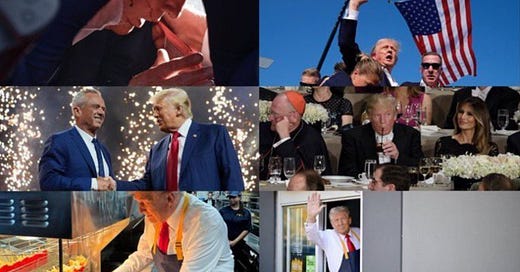






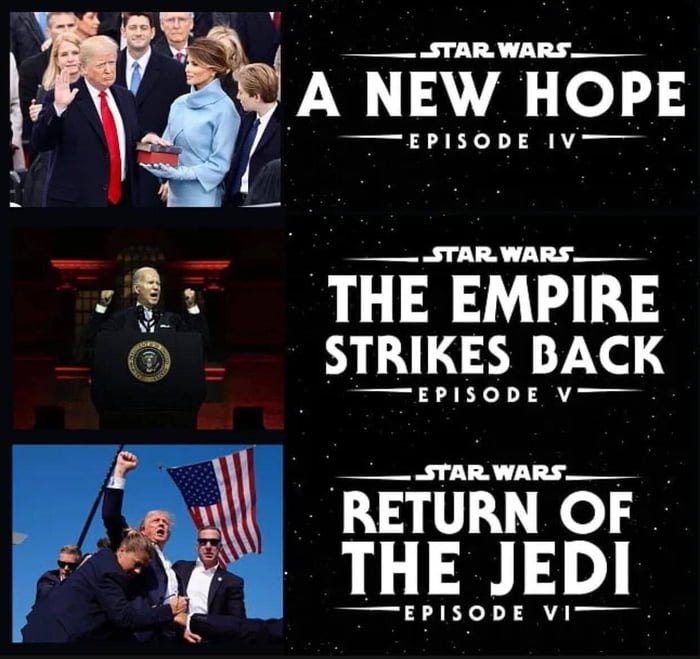


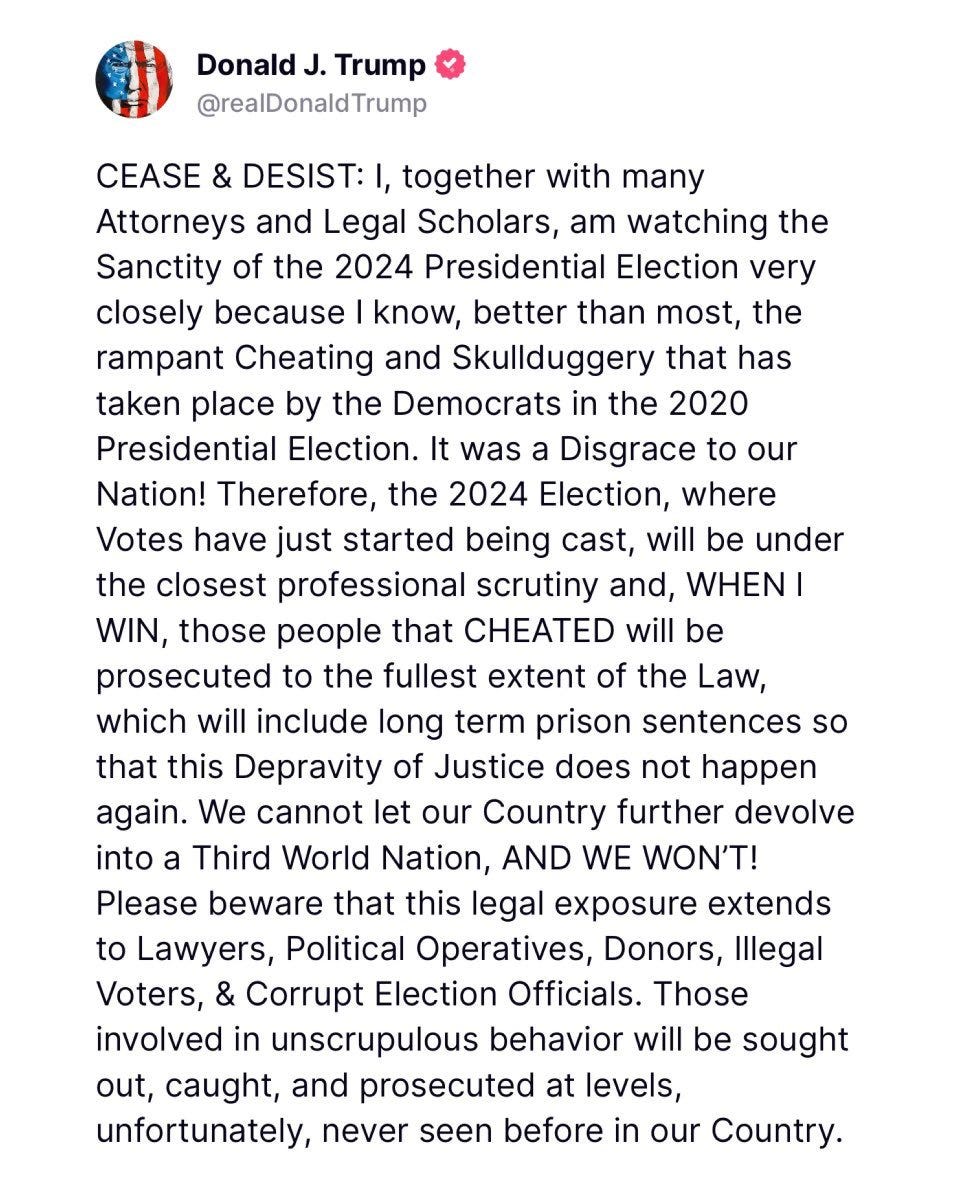
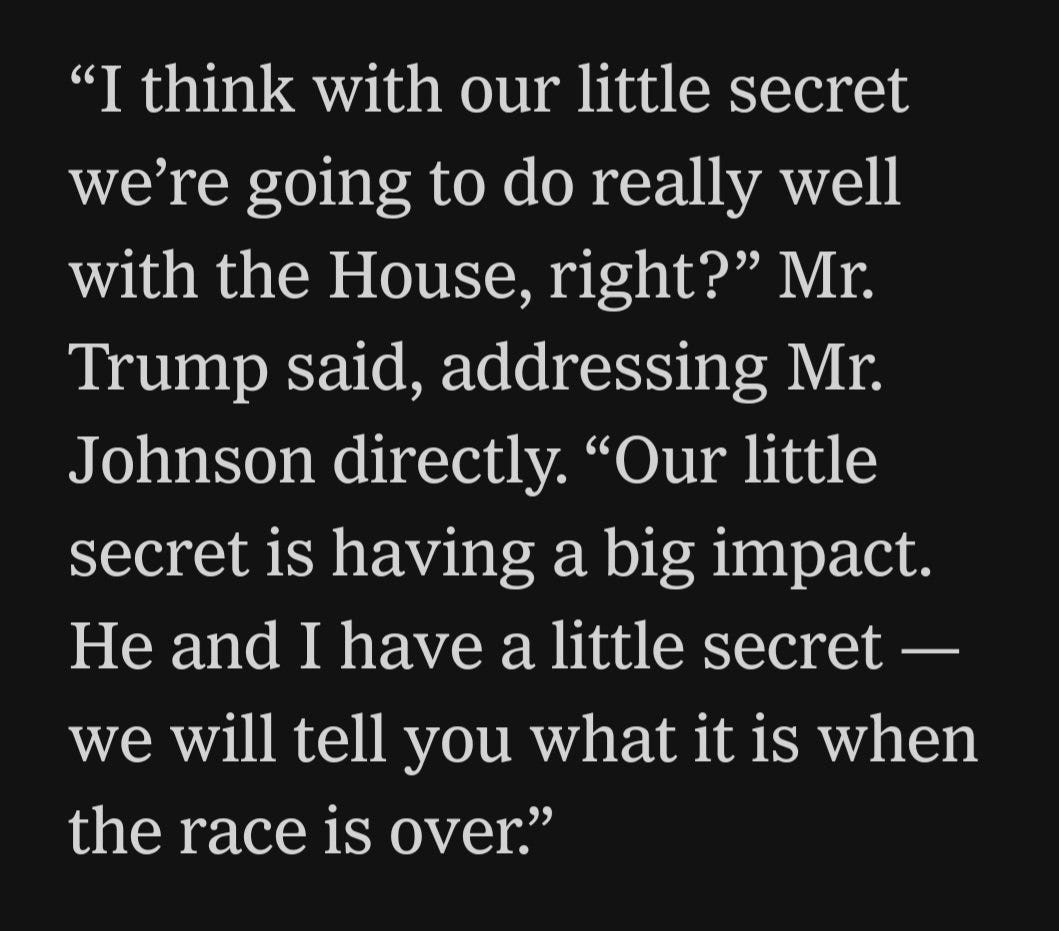
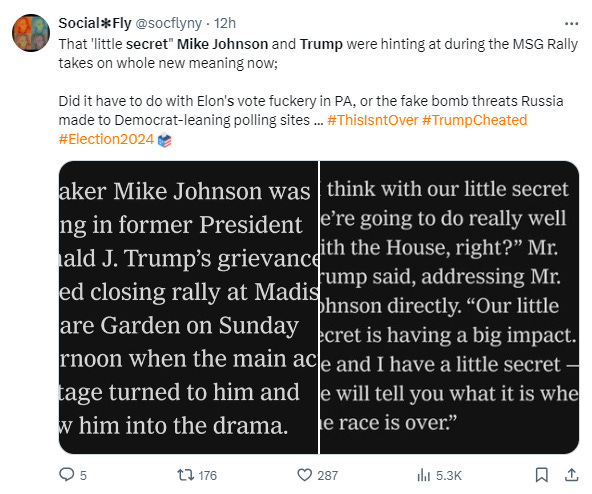




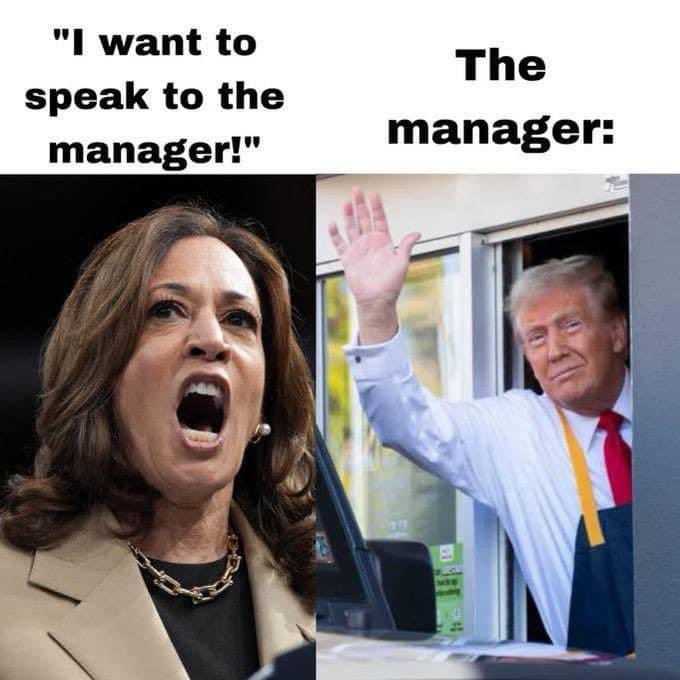



So cool that you are related to this Andrew Brisson who drove the garbage truck and will drive this same truck to DC again later this week!